|
|
THE
POPS CLUB: Jim Willis, Head of UNEP Chemicals, awarded certificates
and pins to heads of delegations in recognition of their governments
support for the POPs negotiation process. Awards were given to Japan,
France, the Netherlands, Germany (above), Thailand (left) and the
European Commission (below). The POPs negotiations are entirely financed
by government donations. |
|
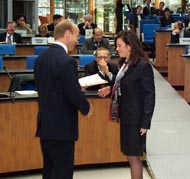 |
| Negotiating
Group: Debate on Article D (Measures to Reduce or Eliminate Releases) |
| ARGENTINA
called for clarification that the article was addressing unintentionally
produced by-products |
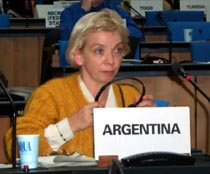 |
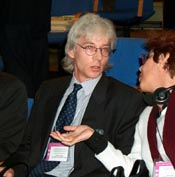 |
 GREENPEACE INTERNATIONAL urged delegates to appreciate that "the
future of the planet is in your hands." He expressed alarm at those
delegates who opposed elimination, and suggested that the comments,
mainly from JUSCANZ, were based on political rather than technical
considerations.
GREENPEACE INTERNATIONAL urged delegates to appreciate that "the
future of the planet is in your hands." He expressed alarm at those
delegates who opposed elimination, and suggested that the comments,
mainly from JUSCANZ, were based on political rather than technical
considerations. |
| Paul
Whylie, the delegate from JAMAICA, urged the Negotiation Group to
set its sights on the ultimate elimination of by-product POPs. He
recalled a lesson that his daughter had been taught at school: "the
litte girl who says I can't, gets the bottom spot." He noted that
most delegates were able to attend this meeting as a direct result
of the actions of those who had once said they would do the impossible
- make man fly. He urged them not to miss an important opportunity
to write history by failing to seize the possibility of agreeing to
eliminate by-product POPs. |
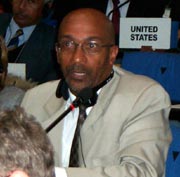 |
 THAILAND emphasized difficulties in promoting control
THAILAND emphasized difficulties in promoting control
measures without financial commitments, techniques and expertise.
|
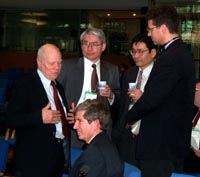 |
Members
of the US and Japanese delegations chatting over coffee and tea during
a short recess. |
| NORWAY
stressed that best available technologies be obligatory for all new
major sources. He proposed text promoting the use of available substitute
materials, products and techniques. |
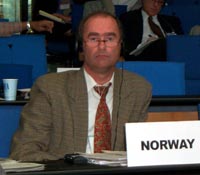 |
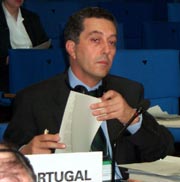 |
 The EU emphasized that the text should reflect a long-term political
commitment to the "elimination" of by-products, arguing that elimination
is not the same as reduction to zero.
The EU emphasized that the text should reflect a long-term political
commitment to the "elimination" of by-products, arguing that elimination
is not the same as reduction to zero. |
 The US noted that inclusion of elimination language might limit
addition of other by-products to the related Annex C on chemicals
subject to release reporting and release reduction or elimination
measures. The US proposed including reference to elimination in the
preamble and objective.
The US noted that inclusion of elimination language might limit
addition of other by-products to the related Annex C on chemicals
subject to release reporting and release reduction or elimination
measures. The US proposed including reference to elimination in the
preamble and objective. |
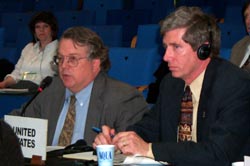 |
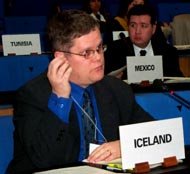 |
Chair
Buccini established a contact group, chaired by Halldor Thorgeirsson
(Iceland, pictured here), to address, inter alia: bracketed
chapeau language regarding elimination; proposals by the EU, Norway
and Nigeria on substitute materials; the provision related to national
action plans; the concept of anthropogenic sources; and Annex C. |
|
Side-Event:
Joint UNEP/GEF Presentation
|
| The
United Nations Environmental Programme and the Global
Environmental Facility held a lunch-time side-event to inform
INC participants on their joint activities. Andrea Merla, GEF Secretariat
(below, second from the left), desribed the different types of projects
that make up the GEF Portfolio on Persistant Toxic Substances (PTS).
|
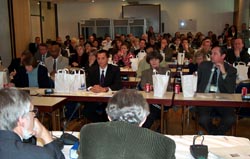 |
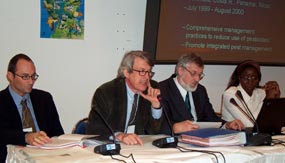 |
Dr.
Bo Wahlstrom, UNEP Chemicals (second from the right), presented the
GEF's upcoming Regionally Based Assessment of PTS, a 2-year, US$5
million project. Fatoumata Ouane, UNEP Chemicals (far right), outlined
the National Management Needs Assessment for PTS, a project still
in the development stage. |
|
Side-Event:
US delegation consultation with NGOs and Industry
|
| The
US delegation held an informal consultation with American NGOs and
industry representatives. The closed session's purpose was to seek
input from the invitees and to clarify the US position. |
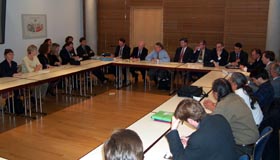 |